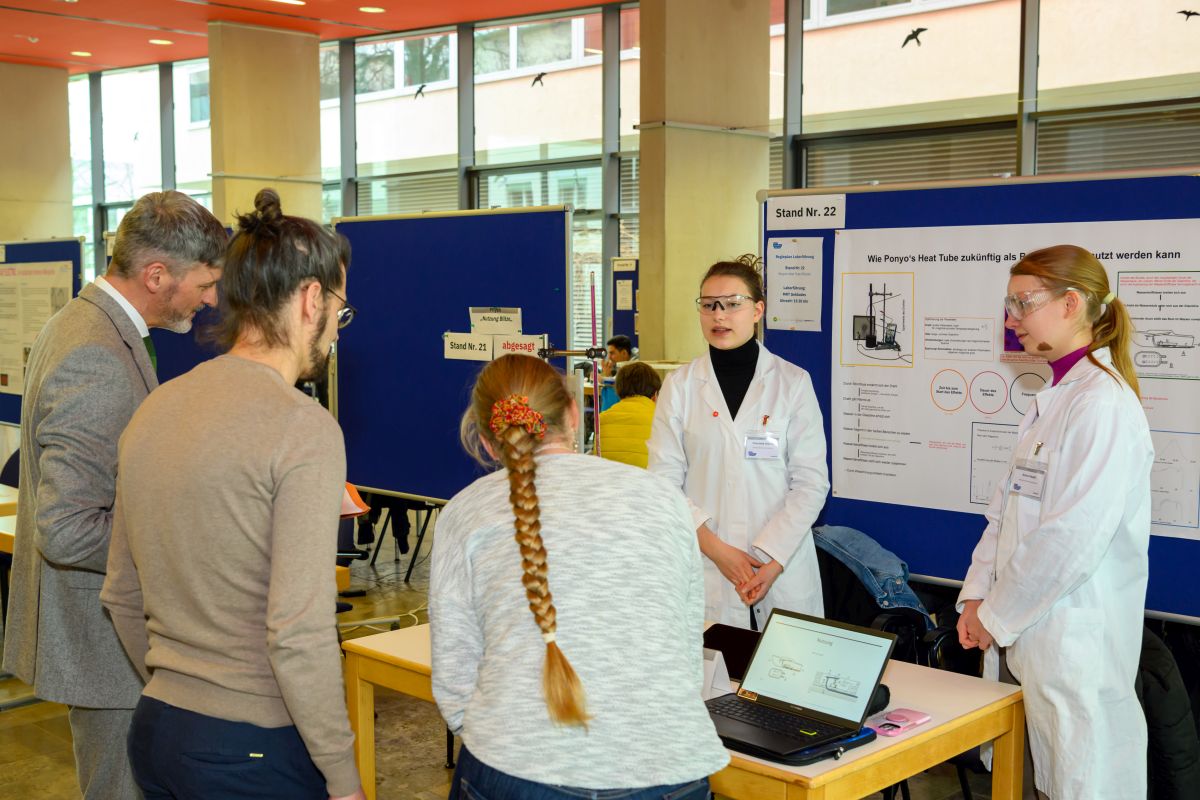Jury selects the best in youth science contest
17.02.2023 / “Mach Ideen groß” is the theme of this year’s nationwide “Jugend forscht” competition. At Campus Berlin-Buch the young scientists presented more than 20 projects. Seven of them made it to the regional championship.

For two days, the campus invited participants to the “Jugend forscht” regional competition in Buch. Children and young people from the 4th grade up to the age of 21 took part. They presented their projects to the jury, the press, and the public – the contest was finally allowed to take place once again after a hiatus due to the pandemic. The winners will go on to compete in Berlin’s statewide competition.
An the winners are...
Three first-place winners and teams emerged from the fields of work, physics and mathematics/computer science: "How stress influences learning" by Dunja Jovicic and "The magnetic, mechanical oscillator" by Konstantin Groth and Rufus Patge were honored. With their artificial intelligence that can detect plant diseases, Elora Marx and Alois Bachmann took first place in the mathematics/computer science category and also received the Max Delbrück Center's special prize: free tickets to the Long Night of Science.
The younger students up to the age of 14 qualified for the state competition with four projects in the "Schüler experimentieren" category: In biology, Yannick Corleisen won with a concept on how to generate electricity and heat from organic waste. Lukas Link found “The best rainbow milk recipe” and took first place in the chemistry section. Xavier Taron Aurelius Volm and Dominik Marcel Rein were also first place winners. They investigated particulate matter pollution during gardening activities (Work Environment); Kai Lehmann was also a regional winner, competing with his project "Generating electricity at home" (Physics).
In addition to the 1st to 3rd places and special prizes sponsored by the research institutions on campus, the Campus Berlin-Buch GmbH "Resource Efficiency" prize went to Raghda Khalaf. The student submitted her project "New Sources of Electricity: Bridging Today and Tomorrow" without personnel or financial support in a shelter for refugees.
The campus sponsors
Campus Berlin-Buch is one of four host venues for “Jugend forscht” in Berlin. The competition’s sponsors include the Max Delbrück Center for Molecular Medicine in the Helmholtz Association (MDC), the Leibniz-Forschungsinstitut für Molekulare Pharmakologie (FMP), Campus Berlin-Buch GmbH and – as an associate sponsor – the Experimental and Clinical Research Center (ECRC), a joint institution of the Max Delbrück Center and Charité – Universitätsmedizin Berlin. They are in charge of organizing a program for the regional round – from the introductory event to the presentations and their evaluation by the jury to the award ceremony.
“The participants come up with surprising ideas and approaches every time,” says Dr. Ulrich Scheller, managing director of Campus Berlin-Buch GmbH. “The competition offers young people a unique chance to actually implement their ideas and see if they work – while inspiring others as well. The kids can also experience science close up on our campus. I’d definitely recommend giving this competition a try.”
About the competition
“Jugend forscht” is Germany’s biggest and best-known competition for the next generation of researchers. It is a joint initiative of the federal government, the magazine Stern, the business and scientific communities, and schools. The aim is to support talented achievers in the areas of science, technology, engineering and mathematics (STEM). Young researchers compete against each year in seven subject areas. Gifted children up to the age of 14 can take part in the junior segment “Schüler experimentieren,” while “Jugend forscht” is open to young people from the age of 15 onwards. The non-profit association Stiftung Jugend forscht e.V. organizes the competition.
Text: CBB & MDC